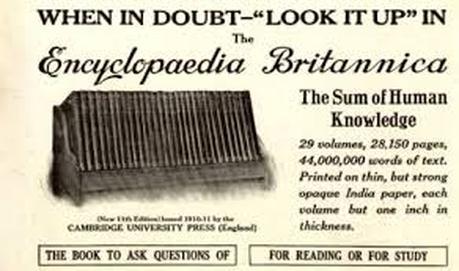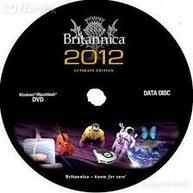 by Leslie Martinelli A few years ago, I read that Encyclopedia Britannica no longer would be printing encyclopedias. Add that to the list of things from my childhood that no longer exist. Don't get me wrong - I'm not anti-progress. Where would we be without air conditioning, microwave ovens, and cell phones? And some of those extinct items deserved to go, like cars without seat belts and manual typewriters. But every now and then technology interferes where it doesn't belong, and I just have to say: Stop! Enough! Encyclopedias are a case in point. Those printed volumes held many fond memories for me. The first set to enter my family’s house came by way of a door-to-door salesman. That set caused some conflict between my parents. My father had warned my mother time and again not to let salesmen in the front door, let alone buy from any of them. They were, he said, like seagulls - once you fed one of them, you couldn't get rid of the flock. Our house was testament to that caveat; we owned a top-of-the-line vacuum and enough brushes and cleaning products to supply the whole neighborhood. My mother stood by her latest purchase, though. As she saw it, that set of encyclopedias was an investment in my and my brothers’ educational futures.  For me, at least, she turned out to be right. That first set of encyclopedias introduced me to the world. Thirty-two volumes filled with history, geography, science, and general knowledge. I was in heaven! I spent many a rainy afternoon sitting cross-legged on the floor with a random volume in my lap. I let the book open to any page and was treated to glossy, full-color photos of exotic plants or remote places, everything from Alaska to Zulu natives. I learned osmotically, soaking up facts about flora and fauna, mountains and tundra. I was kind of a nerd, but I was a smart nerd. You may be wondering why Encyclopedia Britannica abandoning print in favor of an online format is such a big deal. After all, it's not like they’re shutting down and disappearing entirely. Part of it is nostalgia, yet another vestige of my youth that has become obsolete. But it's more than that. There’s an alarming trend among today's youth that I call the “dumbing-down effect.” Kids today are just not as smart as they used to be. They’re not less intelligent, they’re just less informed. They have fewer facts and less information stored in their gray matter. I suggest that there is a direct correlation between this phenomenon and the decline of print reference books. Having a physical book you can hold, with pages that can be turned, stimulates the curiosity nerves, which naturally leads to flipping, scanning, and random perusal. The tactile experience of running the forefinger down the index also leads to subliminal suggestion of topics to be explored, alternatives that hadn’t even been considered. Using the eye and finger in tandem on the page is necessary for the true absorption of knowledge. With internet research, this tactile stimulation and eye-hand coordination – also known as kinesthetic learning – is impossible. The eyes are fixed on the screen, while the hand rests on the mouse. The index finger clicks, clicks, clicks, almost with a mind of its own. Sometimes, the page disappears from the screen before the brain has registered the content. There is no assimilation of information, osmotic or otherwise.  Consider also the first step of a research journey. With internet research, the searcher generally begins by entering a few key terms into Google (or other similar utility), which presents him or her with the "hits" that it deems most relevant. The researcher scans the hits (supposedly arranged by degree of relevance) and selects which site to visit. Proponents of this type of search will argue that search engines make research faster and easier. But where is the humanity? Where is the ability to peruse, to find inspiration in an index, to experience the "a-ha" moment that will lead you to another page or volume? Users of Wikipedia, the free online alternative to the traditional encyclopedia, will argue that they are able to peruse at will by following the many embedded links. They can click on a bright blue word and be redirected to another website, where they supposedly will receive additional information about that subject. This page will contain similar links, and so on, and so on. But who chooses these topics or words to highlight? How does the administrator of Wikipedia know what subject I might be interested in pursuing further? And while we're on the subject of Wikipedia, this non-profit online encyclopedia is available to anyone and can be edited by anyone. This is the equivalent of crossing out text in a volume of your print encyclopedia and substituting your own comments. Students are warned against trusting Wikipedia as a source, yet hundreds of thousands (millions?) of trusting (lazy?) students begin their research at that very site. As you’ve probably guessed by now, I come from a time before the internet. It was a slower time, a happier time, a time when “instant gratification” referred to Tang or Nestlé’s Quik. While they might be fast, they never tasted as good as the original, slower versions. So it is with online encyclopedias. The information can burst forth from your screen with the click of a mouse, but the span of your search will only be as broad as the terms provided, the quality of the photos only as rich as the resolution of your monitor. I apologize for any errors or omissions that you may have found in the above text. My information, after all, came from the internet.
0 Comments
Leave a Reply. |
Archives
April 2024
Categories
All
|
|
Glassworks is a publication of Rowan University's Master of Arts in Writing 260 Victoria Street • Glassboro, New Jersey 08028 glassworksmagazine@rowan.edu |
All Content on this Site (c) 2024 Glassworks
|

 RSS Feed
RSS Feed
